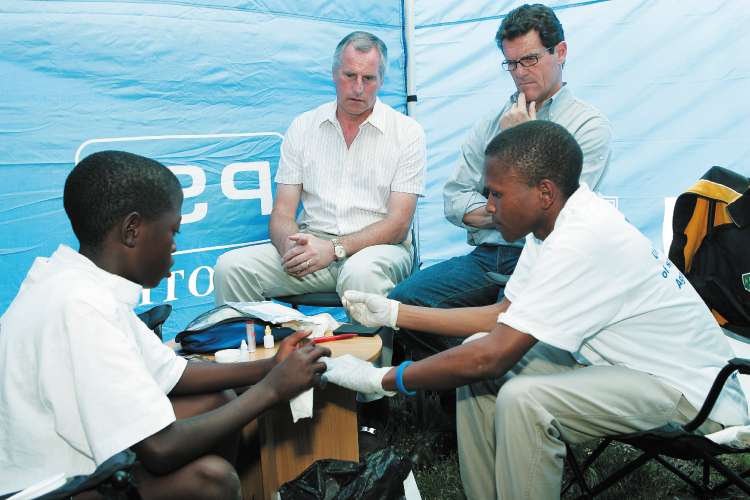Capello gripped by life and death tale in Africa's 'little dot'

Your support helps us to tell the story
From reproductive rights to climate change to Big Tech, The Independent is on the ground when the story is developing. Whether it's investigating the financials of Elon Musk's pro-Trump PAC or producing our latest documentary, 'The A Word', which shines a light on the American women fighting for reproductive rights, we know how important it is to parse out the facts from the messaging.
At such a critical moment in US history, we need reporters on the ground. Your donation allows us to keep sending journalists to speak to both sides of the story.
The Independent is trusted by Americans across the entire political spectrum. And unlike many other quality news outlets, we choose not to lock Americans out of our reporting and analysis with paywalls. We believe quality journalism should be available to everyone, paid for by those who can afford it.
Your support makes all the difference.It would be ludicrous to compare it to managing Real Madrid or taking Milan into a European Cup final against Barcelona or even the pressure that will beat down upon him when England's 2010 World Cup qualifying campaign starts. Yesterday Fabio Capello sat with an African boy while the 14-year-old was told the results of his HIV test; a moment that gave the lie to that old nonsense about football being more important than life and death.
For once that inscrutable lined Italian face seemed to betray an emotion that we have not seen before: the worry of someone who is powerless to change an outcome. It is not a situation that Capello finds himself in often. The child in question peered down at the strip of card upon which his blood sample had been tested and back up at the counsellor who had taken the sample. "Congratulations," he was told, "you have tested negative."
Later Capello reflected on what he had seen in Maseru, the capital of Lesotho, a small kingdom landlocked in South Africa and admitted, with the kind of emotive language he uses rarely, that it had been an extraordinary experience. "There was real intense emotion there," he said. "That was real life, sitting there waiting for the outcome. I have taken part as a guest in many events to help young people but they were never as emotionally gripping as that one."
Before stepping into the tent, Capello had been warned that – with a 23 per cent rate of HIV/Aids among the Lesotho population – there was a good chance that he might be confronted with bad news. Had he tested positive, the boy in question would have been offered counselling and medication and, had he asked, he would have been told that with HIV his life expectancy would be between 30 and 35 years. Earlier the boy had looked delighted to meet the England manager, so much so that it was difficult to tell whether he comprehended what was at stake.
On the second of his two-day visit to Lesotho we have seen a different side of Capello to the £6m-a-year unyielding taskmaster charged with getting the England team to the 2010 World Cup finals. He and the Football Association made no apologies about taking part in the testing process with the boy in question – the FA is in Lesotho to help raise awareness of HIV/Aids through football.
As a strict Catholic, Capello may well have seen the irony that many of the small tents where the tests were carried out yesterday were sponsored by condom manufacturers. The organisers, the British charity Kick 4 Life, had arranged 12 schools to bring around 60 14-year-olds each to a mixed football tournament at which they were encourage to take a HIV test.
When he signed up to the impossible job in December, Capello also agreed to play his part in the FA's international relations programme and, for a man who has always maintained a studied distance from his players he looked very much at ease yesterday. He spoke of a woman from his Italian village of Pieris who is a nun and a charity worker in Africa. "She tells me of the problems here," he said. "I believe public personalities need to get out there, need to be among people and help them if they can."
His presence in Lesotho has been a major event for a country which even the president of the local FA described as a "little dot" on the continent. The experience for Capello was obviously something new even given his usual detachment. "It was tense in that tent," he said. "Fortunately, in football language, we scored a goal so to speak because the tests were negative. I was very worried. I had a few difficult moments in there.
"I suppose you could say this was a very good experience for our soul because it makes you understand the hardships in the world. Football is such a rich sport and it has an obligation to put its wealth to the service of the people who can help the poor and make a difference. I feel enriched because I have seen things that make me think and whenever you think, you get richer."
Join our commenting forum
Join thought-provoking conversations, follow other Independent readers and see their replies
Comments